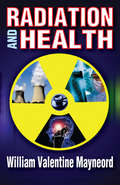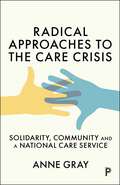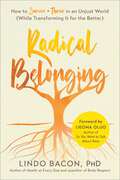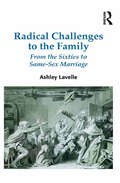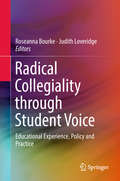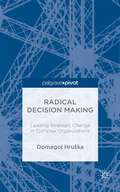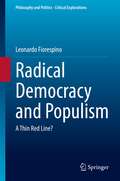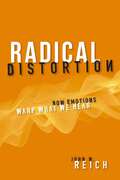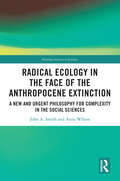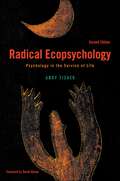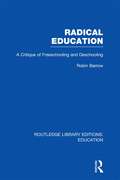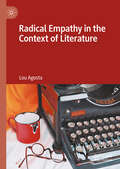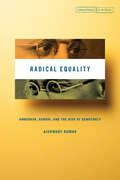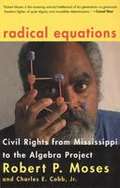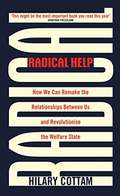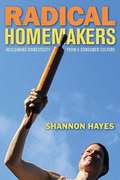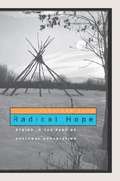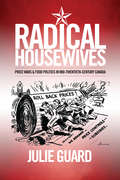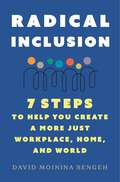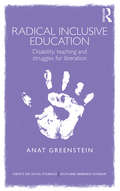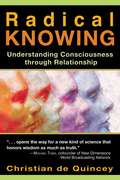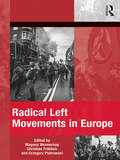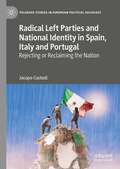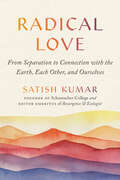- Table View
- List View
Radiation and Health
by Leo KuperThe English philosopher Jeremy Bentham first defined the term "mesology," and its related "social mesology," as being the discipline concerned with the effects upon human beings, as individuals or in society, of meteorological conditions, food and drink, urbanization, sanitation, occupation, domesticity, religion, institutions, laws, and psychological factors. In Radiation and Health, originally published in 1964, William Valentine Mayneord takes this argument one step further by adding "ionizing radiation" to this formidable catalogue. While many people argue that health is a definable and measurable quantity, characteristically expressing it in a negative way via mortality or morbidity statistics, Mayneord argues that the patterns of life throughout the world vary so greatly that no standard can be set for all people, or even for the same people at different times. Moreover, health status has to be looked at from a community, as well as from a personal, point of view, and social well-being may be regarded as a predisposing condition of individual health. In the search for quantitative criteria, many "health indicators" have been classified into three groups: those associated with the health status of persons or populations in a given area, those related to physical environmental conditions having a more or less direct bearing on the health status of the population in an area, and those concerned with health-service activities directed to improvement of health conditions. While radiation has many negative effects, it also has positive ones, including curing diseases. Mayneord acknowledges the dangers of radiation, but believes they are manageable if handled responsibly. This classic volume, long unavailable, is much cited in contemporary research on the subject.
Radical Approaches to the Care Crisis: Solidarity, Community and a National Care Service
by Anne M. GrayThis book explores the critical issue of how to manage the ever-increasing demand for social care in Britain’s ageing society. With informal care from family members and friends now the dominant form of adult social care in the UK, this precarious system is struggling to provide enough support. Exploring the relationship between formal and informal care, this book develops ideas for a ‘caring economy’, showing the potential to integrate paid-for and unpaid care within a framework of solidarity based on the strengths of the community, working to improve the quality and quantity of state-funded care provision while sharing unpaid support more widely as a community responsibility.
Radical Belonging: How to Survive and Thrive in an Unjust World (While Transforming it for the Better)
by Lindo Bacon"Belonging has been a formative struggle for me. Like most people with marginalized identities, my experience has taught me that it's hard to be yourself and feel like you belong in a culture that is hostile to your existence. That's why my body of work as a scientist, author, professor, speaker, and advocate for body liberation always comes back to the impact of belonging or not belonging. Radical Belonging is my manifesto, helping us heal from the individual and collective trauma of injustice and support our transition from a culture of othering to one of belonging." —Lindo Bacon Too many of us feel alienated from our bodies. This isn't your personal failing; it means that our culture is failing you. We are in the midst of a cultural moment. #MeToo. #BlackLivesMatter. #TransIsBeautiful. #AbleismExists. #EffYourBeautyStandards. Those of us who don't fit into the "mythical norm" (white, male, cisgender, able-bodied, slender, Christian, etc.)—which is to say, most of us—are demanding our basic right: To know that who we are matters. To belong. Being "othered" and the body shame it spurs is not "just" a feeling. Being erased and devalued impacts our ability to regulate our emotions, our relationships with others, our health and longevity, our finances, our ability to realize dreams, and whether we will be accepted, loved, or even safe. Radical Belonging is not a simple self-love treatise. Focusing only on self-love ignores the important fact that we have negative experiences because our culture has targeted certain bodies and people for abuse or alienation. For marginalized people, a focus on self-love can be a spoonful of sugar that makes the oppression go down. This groundbreaking book goes further, helping us to manage the challenges that stem from oppression and moving beyond self-love and into belonging. With Lindo Bacon's signature blend of science and storytelling, Radical Belonging addresses the political, sociological, psychological and biological underpinnings of your experiences, helping you understand that the alienation and pain you are experiencing is not personal, but human. The problem is in injustice, not you as an individual. So many of us feel wounded by a culture that has alienated us from our bodies and divided us from each other. Radical Belonging provides strategies to reckon with the trauma of injustice; reclaim yourself, body and soul; and rewire your nervous system to better cope within an unjust world. It also provides strategies to help us all provide refuge for one another and create a culture of equity and empathy, one that respects, includes, and benefits from all its diverse peoples. Whether you are transgender, queer, Black, Indigenous or a Person of Color, disabled, old, or fat—or your more closely resemble the "mythical norm"—Radical Belonging is your guidebook for creating a world where all bodies are valued and all of us belong—and for coping with this one, until we make that new world a reality.
Radical Challenges to the Family: From the Sixties to Same-Sex Marriage
by Ashley LavelleDefending the nuclear family and extolling ’family values’ have long been central features of politics in capitalist societies, in spite of radical left challenges from social, counter-cultural and gay rights movements. This book examines these challenges as they emerged in the 1960s and 1970s, re-appraising their relevance in the light of recent developments, including the spread of more diverse family forms and the rise of the same-sex marriage movement. Drawing on archival research in the US, UK and Australia, the author asks what the emergence of same-sex marriage movements and legislation mean for challenges to the nuclear family in the light of an original general hostility to marriage and family structures in the gay liberation movement, whilst considering the extent to which the nuclear family might be included in the list of social and economic institutions subject to criticism on the part of more recent anti-capitalist movements, such as Occupy. A detailed study of the extent to which the nuclear family remains susceptible to the radical critiques of the last century, Radical Challenges to the Family examines whether the original challenges shed light on ensuring social problems, including domestic violence, child abuse, homophobia, and growing marital dissatisfaction. As such, it will appeal to scholars of sociology and politics with interests in gender and sexuality, the sociology of the family and feminist thought.
Radical Collegiality through Student Voice: Educational Experience, Policy and Practice
by Roseanna Bourke Judith LoveridgeThis book celebrates the rights of the child, through including student voice in educational matters that affect them directly. It focuses on the experiences of children and young people and explores how our educational policies, practices and research endeavours enable educators to help young people tell their own stories. The respective chapters illustrate how listening to young people can help them attain new positions of power, even though doing so often creates discomfort and requires a radical change on the part of the adult establishment. Further, the book challenges researchers, teachers and practitioners to reconsider how students are involved in research and policy agendas, and to what extent radical collegiality can create fundamental and positive changes in the lives of these learners. In recent decades, greater attention has been paid across policy, practice and research discourses to involving children more meaningfully and actively in decisions about their participation in both formal and informal educational settings. The book’s goal is to illustrate how researchers have systematically involved students in the pursuit of a richer understanding of educational experiences, policy and practice through the eyes and ears of young people, and through their own cultural lens.
Radical Decision Making: Leading Strategic Change in Complex Organizations
by Domagoj HruškaRadical Decision Making offers a controversial new framework to the conventional strategic change management conversation. While many approaches provide a discussion on a singular level, Dr. Hru ka blends theory and research of decision making and social interaction to develop a consistent framework of strategic change. "
Radical Democracy and Populism: A Thin Red Line? (Philosophy and Politics - Critical Explorations #18)
by Leonardo FiorespinoThis book offers an extensive comparative analysis of populism and radical democratic theories, tracing the line dividing the respective conceptions of ‘people’ and ‘popular sovereignty’. Whereas populism is often said to intertwine with democracy in some way, the contention of this book is that it significantly departs from democratic theory and practice, and belongs to a distinct conceptual space. It cannot be made to overlap, for instance, with “illiberal democracy”, the “democratic myth”, a crude electoral majoritarianism, nor can it amount to hiding undemocratic policies into properly democratic justifications. These positions, frequent as they are in the literature, are contested on the grounds of the dividing line identified, which starts unfolding at the level of the conception of ‘the people’ – i.e., of the sovereign – presupposed by populists and democrats. This book is of great interest to scholars involved in the study of democratic theory, contemporary challenges to democracy and the recent upsurge of populist discourse, as it helps better understand populism as a political phenomenon and more adequately defines it as a self-standing concept in political theory.
Radical Distortion: How Emotions Warp What We Hear
by John W. ReichOur social unity is under attack from extremists on opposite sides of the political spectrum. Often the loudest and most influential public voices today are also the most divisive. Amid the din of conflicting claims, accusations, and counteraccusations, voices of moderation can no longer be heard. Radical speech is creating hazards for civil discourse and even for governance. Under such conditions, how will we ever find common ground to advance the needs of the nation? Psychologist John W. Reich presents answers to this question in this insightful discussion of the social-science research on the decision-making processes of those who endorse extremist beliefs. A key finding of this research is that extremism causes selective hearing and biases our very ability to form objective judgments. In fact, radical speech leads to radical hearing and impedes our willingness to consider moderate viewpoints. Based on these findings, Reich presents seven principles whereby we can reduce or eliminate the toxic influences of extremist rhetoric and selective hearing. These include becoming aware of how emotion affects our judgments, accepting the fact that we live in a diverse society where differing points of view are common, and detecting when extremist rhetoric is designed solely to attack its opponents. If knowledge is power, then the best antidote to toxic speech is increased scientific understanding of how our judgments are formed. By making the latest social-science research on this important subject accessible, Radical Distortion takes a crucial first step toward creating a more civil society.
Radical Ecology in the Face of the Anthropocene Extinction: A New and Urgent Philosophy for Complexity in the Social Sciences (Routledge Advances in Sociology)
by Anna Wilson John A. SmithThis book has two interlocking ambitions. The first is to steer what we purposefully call the idioms of critical philosophy towards a more ecologically informed paradigm. The second is to recognise that what has rightly come to be called The Anthropocene extinction is not and cannot be treated as simply a scientific fact but rather a socio-political and ecological dispute of immense complexity.We start with an exploration of the consequences of a critical tradition which, under the name Enlightenment, has placed humanity at its centre and chance as its most general – and problematic – characteristic. We argue that this leads to a schizophrenic relationship between radical critique and science which can be avoided if we take the implications of biosemiotics seriously and develop a new, ecologically informed social science. We argue that in practice this means that for science to be practical in addressing the Anthropocene extinction, we have to recognise that it operates in a historically emergent, highly differentiated technopolitical ecology. Science, as it is currently commonly understood and used, is not ecological enough.This book will interest social scientists interested in not only describing and critiquing but also understanding and responding to the complex problems facing humanity; scientists wanting to make sense of social phenomena; those educating the next generation of social scientists; and climate activists and policy-makers.
Radical Ecopsychology, Second Edition: Psychology in the Service of Life (SUNY series in Radical Social and Political Theory)
by Andy FisherPersonal in its style yet radical in its vision, Radical Ecopsychology, Second Edition offers an original introduction to ecopsychology—an emerging field that ties the human mind to the natural world. In order for ecopsychology to be a force for social change, Andy Fisher insists it must become a more comprehensive and critical undertaking. Drawing masterfully from humanistic psychology, hermeneutics, phenomenology, radical ecology, nature writing, and critical theory, he develops a compelling account of how the human psyche still belongs to nature. This daring and innovative book proposes a psychology that will serve all life, providing a solid base not only for ecopsychological practice, but also for a critical theory of modern society. In this second edition, Fisher includes a new preface, a new section looking back at the development of the field since the book's initial publication a decade ago, and a look at the challenges that lie ahead.
Radical Education: A Critique of Freeschooling and Deschooling (Routledge Library Editions: Education)
by Robin BarrowThis volume is a comprehensive critique of the radical tradition in educational theory. It traces the development of the key ideas in radical literature from Rousseau to the present day. Two opening chapters set Rousseau’s educational views and arguments in their political perspective, and subject them to an extended critical treatment. Subsequent chapters provide detailed analyses and examination of the ideas of A S Neill, Paul Goodman, Ivan Illich and Everett Reimer, Charles Weingartner and Neil Postman. Each author is treated separately but certain common themes and ideas are extracted and considered without reference to any particular author. Amongst others, the concepts of nature, learning, hidden curriculum and the relativity of knowledge are examined; at the same time broader arguments about the degree and nature of freedom that should be provided to children, deschooling and assessment are pursued.
Radical Empathy in the Context of Literature
by Lou AgostaIn this book, Lou Agosta explains, using literary examples, that readers require radical empathy to relate to, process, and overcome bad things happening to good people (for example: moral and physical trauma, double binds, soul murder, and behavior in extreme situations.) A definition of radical empathy in the context of literature emerges: Empathic distress occurs, but one’s commitment to the Other is such that one empathizes in the face of empathic distress. One’s empathic commitment to the survivor enables the survivor to recover her/his humanness, integrity, and relatedness. This work engages how the impact and cost of empathic distress affect the different aspects of empathic receptivity, empathic understanding, empathic interpretation, and empathic responsiveness, delivering a breakthrough and transformation in relating to the Other. The intersection of literature and empathy is the place in which the literary artwork transfigures the face of trauma, overcoming empathic distress, and allowing radical empathy to enable the fragmented Other to recover her/his integrity. Additionally, the book does not merely tell the reader about radical empathy in the context of the literary art work; it delivers an experience of radical empathy in context in empathy’s receptivity, understanding, interpretation and responsiveness.
Radical Equality: Ambedkar, Gandhi, and the Risk of Democracy
by Aishwary KumarB. R. Ambedkar, the architect of India's constitution, and M. K. Gandhi, the Indian nationalist, two figures whose thought and legacies have most strongly shaped the contours of Indian democracy, are typically considered antagonists who held irreconcilable views on empire, politics, and society. As such, they are rarely studied together. This book reassesses their complex relationship, focusing on their shared commitment to equality and justice, which for them was inseparable from anticolonial struggles for sovereignty. Both men inherited the concept of equality from Western humanism, but their ideas mark a radical turn in humanist conceptions of politics. This study recovers the philosophical foundations of their thought in Indian and Western traditions, religious and secular alike. Attending to moments of difficulty in their conceptions of justice and their language of nonviolence, it probes the nature of risk that radical democracy's desire for inclusion opens within modern political thought. In excavating Ambedkar and Gandhi's intellectual kinship, Radical Equality allows them to shed light on each other, even as it places them within a global constellation of moral and political visions. The story of their struggle against inequality, violence, and empire thus transcends national boundaries and unfolds within a universal history of citizenship and dissent.
Radical Equations: Civil Rights from Mississippi to the Algebra Project
by Charles E. Cobb Robert MosesAt a time when popular solutions to the educational plight of poor children of color are imposed from the outside—national standards, high-stakes tests, charismatic individual saviors—the acclaimed Algebra Project and its founder, Robert Moses, offer a vision of school reform based in the power of communities. Begun in 1982, the Algebra Project is transforming math education in twenty-five cities. Founded on the belief that math-science literacy is a prerequisite for full citizenship in society, the Project works with entire communities—parents, teachers, and especially students—to create a culture of literacy around algebra, a crucial stepping-stone to college math and opportunity. This book provides a model for anyone looking for a community-based solution to the problems of our disadvantaged schools.
Radical Help: How we can remake the relationships between us and revolutionise the welfare state
by Hilary CottamHow should we live: how should we care for one another; grow our capabilities to work, to learn, to love and fully realise our potential? This exciting and ambitious book shows how we can re-design the welfare state for this century. The welfare state was revolutionary: it lifted thousands out of poverty, provided decent homes, good education and security. But it is out of kilter now: an elaborate and expensive system of managing needs and risks. Today we face new challenges. Our resources have changed. Hilary Cottam takes us through five 'Experiments' to show us a new design. We start on a Swindon housing estate where families who have spent years revolving within our current welfare systems are supported to design their own way out. We spend time with young people who are helped to make new connections - with radical results. We turn to the question of good health care and then to the world of work and see what happens when people are given different tools to make change. Then we see those over sixty design a new and affordable system of support. At the heart of this way of working is human connection. Upending the current crisis of managing scarcity, we see instead that our capacities for the relationships that can make the changes are abundant. We must work with individuals, families and communities to grow the core capabilities we all need to flourish. Radical Help describes the principles behind the approach, the design process that makes the work possible and the challenges of transition. It is bold - and above all, practical. It is not a book of dreams. It is about concrete new ways of organising that already have been developing across Britain. Radical Help creates a new vision and a radically different approach that can take care of us once more, from cradle to grave.
Radical Help: How we can remake the relationships between us and revolutionise the welfare state
by Hilary CottamHow should we live: how should we care for one another; grow our capabilities to work, to learn, to love and fully realise our potential? This exciting and ambitious book shows how we can re-design the welfare state for this century. The welfare state was revolutionary: it lifted thousands out of poverty, provided decent homes, good education and security. But it is out of kilter now: an elaborate and expensive system of managing needs and risks. Today we face new challenges. Our resources have changed. Hilary Cottam takes us through five 'Experiments' to show us a new design. We start on a Swindon housing estate where families who have spent years revolving within our current welfare systems are supported to design their own way out. We spend time with young people who are helped to make new connections - with radical results. We turn to the question of good health care and then to the world of work and see what happens when people are given different tools to make change. Then we see those over sixty design a new and affordable system of support. At the heart of this way of working is human connection. Upending the current crisis of managing scarcity, we see instead that our capacities for the relationships that can make the changes are abundant. We must work with individuals, families and communities to grow the core capabilities we all need to flourish. Radical Help describes the principles behind the approach, the design process that makes the work possible and the challenges of transition. It is bold - and above all, practical. It is not a book of dreams. It is about concrete new ways of organising that already have been developing across Britain. Radical Help creates a new vision and a radically different approach that can take care of us once more, from cradle to grave.
Radical Homemakers
by Shannon HayesMother Nature has shown her hand. Faced with climate change, dwindling resources, and species extinctions, most Americans understand the fundamental steps necessary to solve our global crises-drive less, consume less, increase self-reliance, buy locally, eat locally, rebuild our local communities. In essence, the great work we face requires rekindling the home fires. Radical Homemakersis about men and women across the U. S. who focus on home and hearth as a political and ecological act, and who have centered their lives around family and community for personal fulfillment and cultural change. It explores what domesticity looks like in an era that has benefited from feminism, where domination and oppression are cast aside and where the choice to stay home is no longer equated with mind-numbing drudgery, economic insecurity, or relentless servitude. Radical Homemakersnationwide speak about empowerment, transformation, happiness, and casting aside the pressures of a consumer culture to live in a world where money loses its power to relationships, independent thought, and creativity. If you ever considered quitting a job to plant tomatoes, read to a child, pursue creative work, can green beans and heal the planet, this is your book.
Radical Hope: Ethics in the Face of Cultural Devastation
by Jonathan LearThis book raises a profound ethical question : how should one face the possibility that one's culture might collapse?
Radical Housewives: Price Wars and Food Politics in Mid-Twentieth-Century Canada (Studies in Gender and History)
by Julie GuardRadical Housewives is a history of Canada’s Housewives Consumers Association. This association was a community-based women’s organization with ties to the communist and social democratic left that, from 1937 until the early 1950s, led a broadly based popular movement for state control of prices and made other far-reaching demands on the state. As radical consumer activists, the Housewives engaged in gender-transgressive political activism that challenged the government to protect consumers’ interests rather than just those of business while popularizing socialist solutions to the economic crises of the Great Depression and the immediate postwar years. Julie Guard's exhaustive research, including archival research and interviews with twelve former Housewives, recovers a history of women’s social justice activism in an era often considered dormant and adds a Canadian dimension to the history of politicized consumerism and of politicized materialism. Radical Housewives reinterprets the view of postwar Canada as economically prosperous and reveals the left’s role in the origins of the food security movement.
Radical Inclusion: Seven Steps to Help You Create a More Just Workplace, Home, and World
by David Moinina SengehBEST BOOKS OUT THIS WEEK, KIRKUS CRITIC'S PICKS"Using stories and examples, David Moinina Sengeh presents seven principles for radical inclusion that are AS ACTIONABLE AS THEY ARE POWERFUL." ―Brené Brown “This book is a master class in innovation and human transformation.” ―Kwame AlexanderCan you imagine a world where everyone belongs?Readers who have encountered this extraordinary book after seeing it featured on the Today Show and at packed events across the country are discovering that Radical Inclusion is unlike any book they’ve ever read before – and is the book we all most need now. David Moinina Sengeh has written a page-turning and deeply human story that gives a remarkable blueprint we can apply to our daily lives.Inspiring, moving, and often humorous, the book includes wonderful stories and anecdotes that show us specific techniques to make our homes, workplaces, and communities happier and more just places for everyone. Sengeh takes us with him on his own remarkable journey as he learns how to:1. Identify the exclusion2. Listen, to understand and learn3. Define your role – why you, why now?4. Build a coalition5. Pursue advocacy and action6. Adapt to a new normal7. See beyond inclusionGet ready to be inspired by David Moinina Sengeh and his vision for Radical Inclusion. In a career spanning the globe, he has empowered girls through universal education and advocacy. Now YOU can learn from his experiences through his book, Radical Inclusion, the first release from Moment of Lift Books, created by Melinda French Gates.
Radical Inclusive Education: Disability, teaching and struggles for liberation (Concepts for Critical Psychology)
by Anat GreensteinMany people who work in education start out with enthusiastic ideals about education as a positive force that can spur change in the life of the learner and in society at large, yet find themselves frustrated with a bureaucratic system that often alienates and excludes many of its students. This is particularly true for students identified as having "special educational needs" (SEN) or disability, a label often used to justify the ways in which students are failed by a system that focuses on narrow definitions of knowledge, seeks to normalise and control behaviour, and values economic productivity over other forms of human activity. Radical Inclusive Education explores how current educational practices, such as standardised tests and league tables, exclude and fail many disabled students, and naturalise educational inequalities around gender, class, ethnicity and ability. Informed by the social model of disability, the book argues that educational theories and practices that are geared towards social justice and inclusion need to recognise and value the diversity of human embodiments, needs and capacities, and foster pedagogical practices that support relations of interdependency. The book draws on work in disability studies, critical psychology and critical pedagogy, and also real life examples from interviews with activists in the disabled people’s movement, and from research in a school, to offer examples of what radical inclusive education – that is sensitive to the needs of all students – might look like in practice. As such, it will be of great interest to practitioners and students in the field of education, particularly for those interested in SEN and disability, sociology of education, critical pedagogy, informal education and social movement learning.
Radical Knowing: Understanding Consciousness through Relationship
by Christian De QuinceyA radical reassessment of what we mean by "consciousness" and how we experience it in relation to others • Shows the importance of integrating different ways of knowing--such as feeling and intuition, reason and the senses--in our approach to life • Discusses the technique of Bohmian Dialogue where you can learn not only to "feel your thinking," but also to experience true communion with others In Radical Knowing Christian de Quincey makes a provocative claim: We are not who we think we are. Instead, we are what we feel. Giving disciplined attention to feelings reveals the most fundamental fact of life and reality: We are our relationships. Most of us think we are individuals first and foremost who then come together to form relationships. De Quincey turns this "obvious fact" on its head and shows that relationship comes first, and that our individual sense of self--our "private" consciousness--actually arises from shared consciousness. This shared, collective consciousness is at the heart of indigenous ways of life and their worldviews. De Quincey explains that participating in shared consciousness literally builds the fabric of reality, and that understanding this process is key to unlocking our potential for higher consciousness and spiritual evolution. He presents the technique of Bohmian Dialogue, developed by groundbreaking quantum physicist David Bohm, as one method for experiencing this powerful process. He also explores the mystery of synchronicity, offering a new understanding of the relationship between matter and mind and the underlying nature of reality.
Radical Left Movements in Europe (The Mobilization Series on Social Movements, Protest, and Culture)
by Magnus Wennerhag Christian Fröhlich Grzegorz PiotrowskiWhen the Iron Curtain lifted in 1989, it was seen by some as proof of the final demise of the ideas and aspirations of the radical left. Not many years passed, however, before the critique of social inequalities and capitalism was once again a main protest theme of social movements. This book provides an account of radical left movements in today’s Europe and how they are trying to accomplish social and political change. The book’s international group of leading experts provide detailed analysis on social movement organizations, activist groups, and networks that are rooted in the left-wing ideologies of anarchism, Marxism, socialism, and communism in both newly democratized post-communist and longstanding liberal-democratic polities. Through a range of case studies, the authors explore how radical left movements are influenced by their situated political and social contexts, and how contemporary radical left activism differs from both new and old social movements on one hand, and the activities of radical left parliamentary parties on the other. Ultimately, this volume investigates what it means to be ‘radical left’ in current day liberal-democratic and capitalist societies after the fall of European state socialism. This is valuable reading for students and researchers interested in European politics, contemporary social movements and political sociology.
Radical Left Parties and National Identity in Spain, Italy and Portugal: Rejecting or Reclaiming the Nation (Palgrave Studies in European Political Sociology)
by Jacopo CustodiThis book investigates how the radical left navigates the terrain of nationalism. Traversing Spain, Italy and Portugal, this in-depth study examines how radical left parties either embrace, rebuff or reshape nationalistic sentiments. From Spain’s Podemos grappling with Franco’s legacy, Italy’s radical left switching from anti-fascist patriotism to cosmopolitanism, to Portugal’s revolutionary echoes in left-leaning banal nationalism, the book offers comprehensive insight into the often-overlooked relationship between radical left politics and national identity. Through discourse analysis, interviews and participant observation, it delves into the reasons behind certain political positions and how they manifest discursively. A must-read for those eager to decipher the crossroads of national identity and left-wing politics in contemporary Europe.
Radical Love: From Separation to Connection with the Earth, Each Other, and Ourselves
by Satish KumarTo see peace in our lifetimes, we have to practice love.This is the radical message of this inspirational book of pithy advice from environmental activist Satish Kumar, which helps us find ways to love ourselves, others, and all beings on planet Earth—even those we may find unlovable.Satish Kumar is well known for his epic walk for world peace in his youth in the 1960s from India to the nuclear capitals of Moscow, Paris, London, and Washington, DC. Wherever he traveled, he found that human beings were capable of a love that could overcome hatred and division. Settling down in the UK, he married his wife, June Mitchell, and founded eco-university Schumacher College in Devon, eventually becoming a leading figure in the UK green movement.Radical Love distills the author's lifetime of experience as a lover, parent, activist, and educator into simple lessons on transforming our time of ecological crisis, conflict, and scarcity into one in which we experience harmony with nature, safety, and abundance. It is an exploration of the transformative power of love in all its forms, from romantic love to love for one's family and community to love for the planet and all beings. Kumar's approach is founded on simplicity (including the Jain principle of aparigraha), generosity, and continuous learning. Like an unfolding metta meditation, the book expands our notions of love to its most sublime universal state and makes a great gift to share with those we love.
